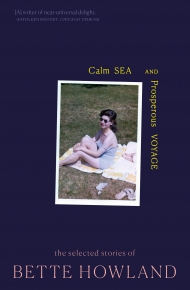On Irrelevance: Part III
Amy Leach • October 1, 2013
This article originally appeared on April 1, 2010.
Relevant writers have their place, to be sure. But relevance seems to hold a despotic ascendancy these days—everybody wants to be relevant; everybody wants everybody else to be relevant. Relevance is not the only virtue! Irrelevance is also a virtue! The sun is not only a vector of cancer and vitamin D; the sun also makes my Pomeranian twirl. Here is a list of a few of my favorite irrelevant writers:
On Irrelevance: Part II
Tim O’Sullivan • October 1, 2013
This article originally appeared on March 31, 2010.
A taste for topical relevance is cool. There are better places to look than fiction. Newspapers maybe. On TV, pundits speak provocatively on topics of the day. Fiction can handle these topics too, but I suppose people will always argue whether it’s the most appropriate tool and/or for how long the relevant topic will remain relevant.
On Irrelevance: Part I
Mary-Beth Hughes • October 1, 2013
This article originally appeared on March 30, 2010.
Around Halloween, I packed up my mother’s books and brought them home. She was a committed public library patron, so I’d love to know the books she liked enough to buy and keep, what she saved to go back to. But before I unpack boxes, I’m looking to my own shelves to remember some of what’s been essential to me.
Stet?
Ed Roberson • October 1, 2013
This article originally appeared on March 3, 2010.
Hey Ed, I hope you're well. We're finishing up the new issue, and my proofreaders keep querying the space in the fourth stanza of your poem, so I thought better safe than sorry. Attached are your proofs—would you confirm that the space in the line "down from the outer layers inward into—" is supposed to be there? Thanks! Anne
In Praise of Irrelevance: Part I
Salvatore Scibona • October 1, 2013
This article originally appeared on February 25, 2010.
On Dialogue
Gary Amdahl • October 1, 2013
This interview was conducted by Emily Cook and originally appeared on October 1, 2009
Do you consider yourself to be a dramatic sort of person?
Yes, but not dramatic in a good way—the way, say, someone is who risks his life for a common good, to save the life of a drowning child, or who takes an unpopular but principled stand on a moral issue at a critical moment. Or even a tragic hero who makes a terrible mistake and pays a terrible price. Dramatic rather in a bad way.
After the Wreck: On Historical Fictions and Fictional Histories
Naomi J. Williams • October 1, 2013
This article originally appeared on October 8, 2009.
Everyone likes a shipwreck story. I’m certainly not the first writer to be drawn to the La Pérouse expedition, an ill-fated voyage of exploration that left France in 1785 with two frigates under the command of Jean-François de Galaup de La Pérouse, and disappeared three years later in the South Pacific. Part of the early mystique of the La Pérouse story, of course, was that for almost forty years no one knew what had become of the expedition. It’s always a boon to fictionalizers when people disappear into thin air.
Minor Aspirations and Mock Debate
Charles Newman • October 1, 2013
This article originally appeared on September 29, 2009.
There are two kinds of magazines—those which fascinate with nouns, and those which delight in verbs. The former are more proper: dealing modestly with time and life, they assert rather than explain; to sell things, they name things. The latter, more common, more active, tend to make a statement, ask a question, give a command. Their tenses are generally more progressive and less tangible. This is a perfect situation for dialectic, but there isn’t one.
Alone in Abu Tor
October 1, 2013
This article originally appeared on April 9, 2009.
A couple of years ago I found myself working as an artist on a new animated film being made overseas. Although the movie's creators were Californian, the money behind the film was Israeli, and the principal investor had a much cherished vision of creating a vibrant arts and culture hub in the unlikely location of Jerusalem. Dour, Stoney, Combustible, Contested Jerusalem.
The Inn at St. John
Sara Majka • October 1, 2013
This article originally appeared on August 17, 2009.
Years ago, I became fascinated with a hotel in Portland, Maine, though I’m not sure why. The Inn at St. John is a basic hotel near the bus station, not gritty enough to explain my fascination. I’ve never been in, but pictures on the website show velvet curtains and furniture that’s meant to look Victorian. Quotes promise that it’s "comfortable and a good value" and “CLEAN!” It offers three room tiers: pet-friendly rooms, economically priced rooms for extended visits, or romantic luxury accommodations for weekend getaways. If you want any of these things, it says, the hotel is exactly what you’re looking for.
Page 14 of 15 pages ‹ First < 12 13 14 15 >
Back to Top

